Search
Showing 10 of 1803 results for NARSC 2016 July student registration fees
-
From the CE: Building back New Zealand’s international education experience
One of the highlights for me was experiencing a warm Southern welcome in Christchurch and Dunedin, in late August. It was useful to hear from a cross-section of key education providers and other education-related organisations about what’s top of mind for them. There was an opportunity to hear about their plans for the year ahead and discuss what’s being planned at Education New Zealand Manapou ki te Ao (ENZ), and how we can best support each other.
People expressed cautious optimism about inbound student numbers for 2022, saying they have adequate applications in the pipeline to be comfortable with progress (as much as 50% of pre-pandemic levels for some). They mentioned that the fourth border exception group of international students, Cohort 4, is having a positive impact on student numbers. Many of the recent arrivals had started their studies with New Zealand online in their home countries – a testament to the huge effort made by providers, with support from agents and our international teams, to continue reaching out to students and offering online study options while our borders were closed.
The visit ended with a Christchurch City Council and ChristchurchNZ mayoral welcome for around 140 tertiary international students, from across the wider Christchurch region – a memorable evening.
Another successful welcome for international students took place in September, hosted by the University of Auckland. Both Prime Minister Jacinda Ardern and Education Minister Chris Hipkins spoke at the event, in a clear demonstration of the government’s commitment to international students and international education.
This week I returned from a short visit to London and Barcelona, as part of ENZ’s plans to revisit all our key partner countries now our borders have reopened. The timing coincided with the annual EAIE Conference and Exhibition in Barcelona, which attracted more than 6,300 participants from over 90 countries. EAIE is the largest business-to-business conference and international education event in Europe. It provided a great opportunity to reconnect with key partners and other contacts, and to continue to let them know we are open to welcome students. You can read more about New Zealand’s pavilion at EAIE and the providers who took part in this month’s E-News.
In London, I had a series of meetings with key government and education sector contacts, including Professor Sir Steve Smith, the UK Government International Education Champion. A range of opportunities were discussed during these meetings, and we will follow up on these with the sector in New Zealand. I also met with journalists to promote a New Zealand education, including Times Higher Education and StudyTravel magazine. The final engagement of the London trip before heading off to Barcelona involved presenting an award at the PIEoneer Awards ceremony. The four awards won by New Zealand organisations that evening are covered later in this issue.
Finally, I’d like to thank everyone involved in the Asia Pacific Technical & Vocational Education and Training Forum, which took place from 14-15 September 2022. This online event, which is run in partnership between Te Pūkenga, Skills Consulting Group and ENZ, attracted more than 2,000 delegates from 60 countries, and has resulted in significant positive feedback.
In the spirit of Te Wiki o te Reo Māori I’d like to end with a whakataukī that highlights the importance of language:
Kia kaha, te reo Māori - Let’s make the Māori language strong!
Ngā mihi nui,
Grant McPherson
-
Showcasing New Zealand education at EAIE 2022
Held from 13-16 September in Barcelona, Spain, the 32nd Annual EAIE Conference and Exhibition attracted more than 200 exhibitors and 6,300 participants for a packed programme of sessions, networking events and plenaries. This was an ideal platform for New Zealand institutions and the ENZ team to meet with key stakeholders, including government and university partners, education agents, and study abroad and pathway providers.
New Zealand’s branded pavilion featured the kākahu (garment) created for German student Malina Grube from the I AM NEW campaign, and attracted attention from European and global education professionals.
Alongside their busy schedule of meetings and appointments, the New Zealand representatives also attended a networking event organised by ENZ, which brought together more than 100 key education partners.
Speaking at the event, ENZ Chief Executive Grant McPherson said the value of New Zealand's education relationships in Europe lies in student mobility, and in the quality of the academic relationships between New Zealand and European partners, the strong research and innovation links between us, and the ties these build beyond the education sector.
“I am proud of the many educational partnerships and connections New Zealand’s institutions have with European counterparts and globally,” he said.
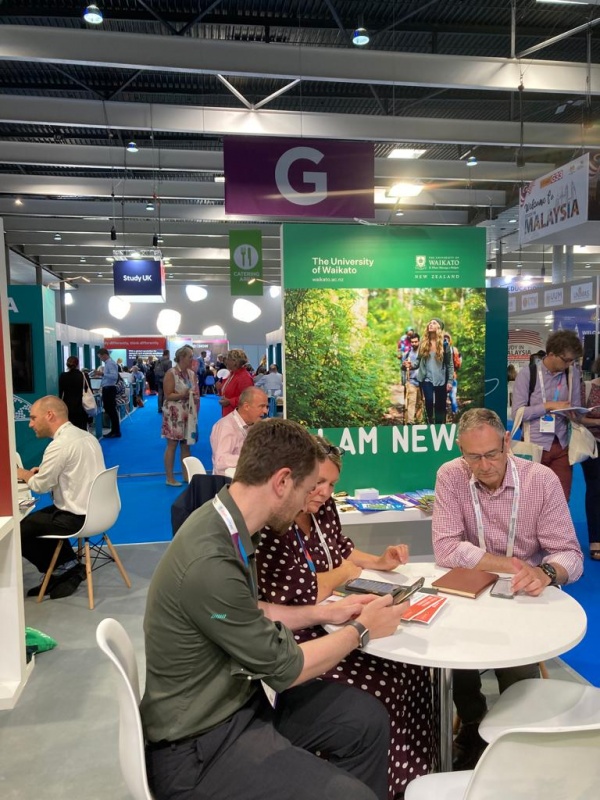
LtoR: Richard Witts, Regional Manager – Africa, Middle East & Europe, Sharon Calvert, Director, International, and Alister Jones, Senior Deputy Vice-Chancellor, the University of Waikato
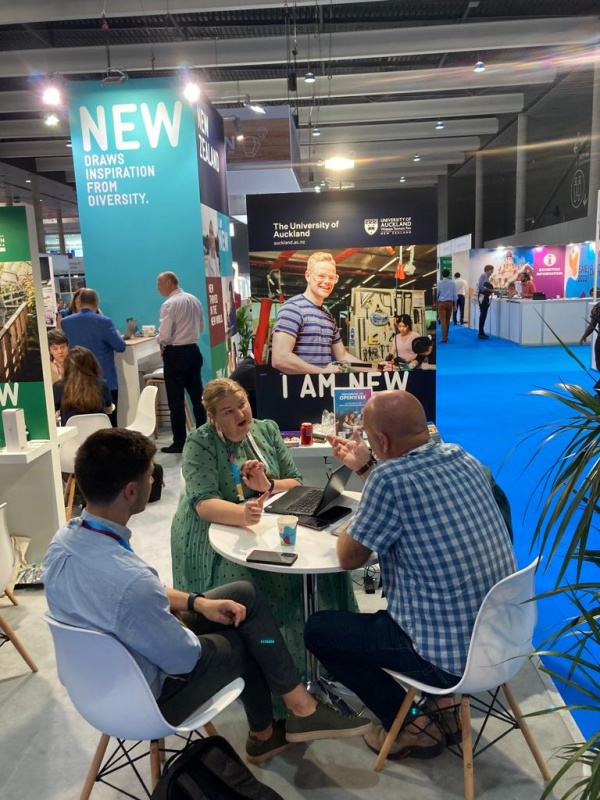
Ainslie Moore, Interim Director International, the University of Auckland, meets with key contacts
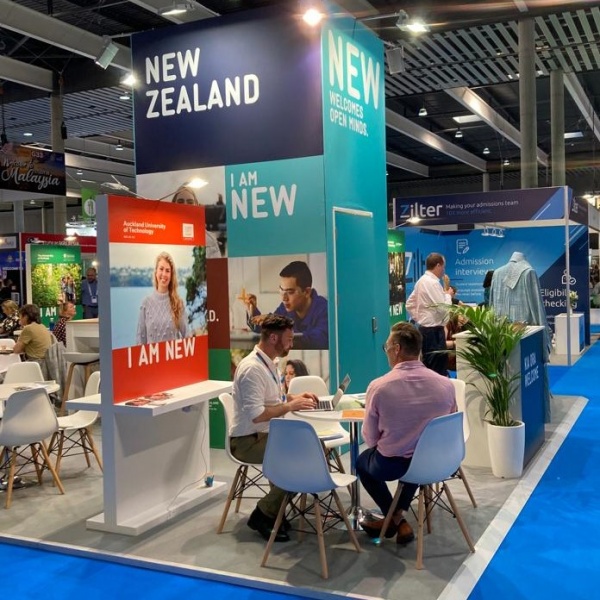
The New Zealand pavilion, with Brett Armstrong, Study Abroad Manager, Auckland University of Technology, in the foreground and the kākahu on display beside the welcome desk.
-
Important update: passport requirements for temporary visa applicants offshore
Immigration New Zealand has announced a change to passport requirements that affect a number of temporary visa applicants offshore. This change is in effect now.
The change means that people applying from offshore for a student, visitor or work temporary visa only need to send Immigration New Zealand a high-quality scan of their passport, not a physical copy.
An Immigration Officer may still ask for a physical passport if they consider it necessary for the application. This will be on a case-by-case basis.
This is a temporary measure to help with visa processing. People applying for a student visa or group visitor visa through the Immigration Online form will currently receive an automated letter asking for a physical passport to be submitted. This is not required, and Immigration New Zealand is working to update the letter to reflect the change in requirements.
Visit Immigration New Zealand to learn more about passport requirements.
-
New ECA signed with US institution
Increased opportunities for students and researchers from diverse backgrounds to study and carry out research in New Zealand, and more international opportunities for Māori will result from the new agreement between the Louis Stokes Alliance for Minority Participation-National Science Foundation International Center of Excellence (LSAMP-NICE) and Education New Zealand Manapou ki te Ao (ENZ).
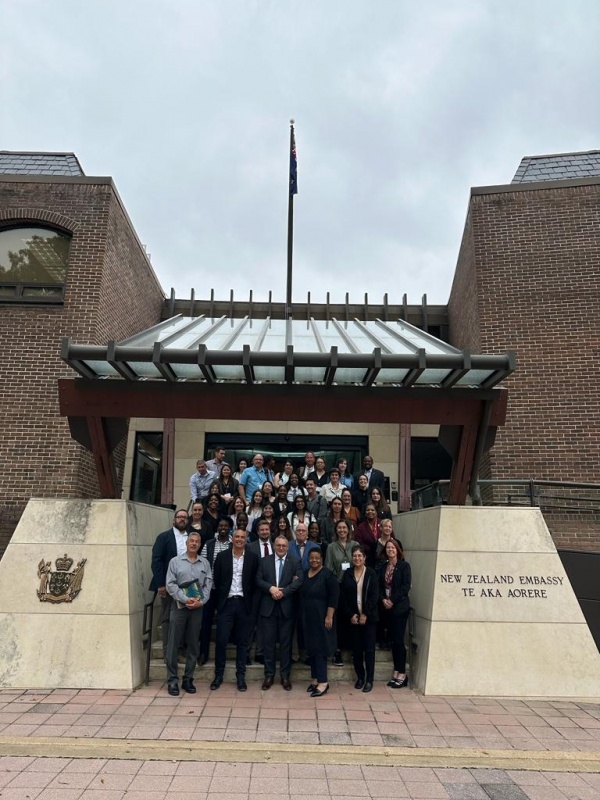
Attendees outside the Embassy of New Zealand in Washington DC, where the meeting was held
The Embassy of New Zealand in Washington DC was the venue for the annual general meeting and conference of LSAMP-NICE on 29-30 September 2022. Representatives of 60 LSAMP institutions across the US attended, as well as international partners including the University of Toulouse, the French Embassy, a Te Kāhui Amokura delegation, and ENZ. The role of Te Kāhui Amokura is to advance and promote the collective interests of New Zealand’s universities to improve outcomes for Māori, and the delegation comprised:
- Rawinia Higgins, Deputy Vice-Chancellor, Māori, at Victoria University of Wellington (VUW)
- Meegan Hall, Assistant Vice-Chancellor Mātauranga Māori, VUW
- Fiona Johnson-Bell, Senior Manager, Education and Māori, Universities New Zealand
- Tim Manukau, Mātauranga Co-Director, University of Waikato Environmental Research Institute
- Megan Ranapia, PhD student, University of Waikato
- Kirita-Rose Escott, PhD student, VUW.
ENZ Manukura Chief Advisor Māori, Ed Tuari, welcomed attendees with a mihi whakatau, and Lance Fisher (Northern Cheyenne) responded with a traditional Northern Cheyenne song. The meeting ended with the signing of the new agreement by Steve Dupuis, LSAMP-NICE Project Principal Investigator, Salish Kootenai College, and Ed Tuari on behalf of ENZ.
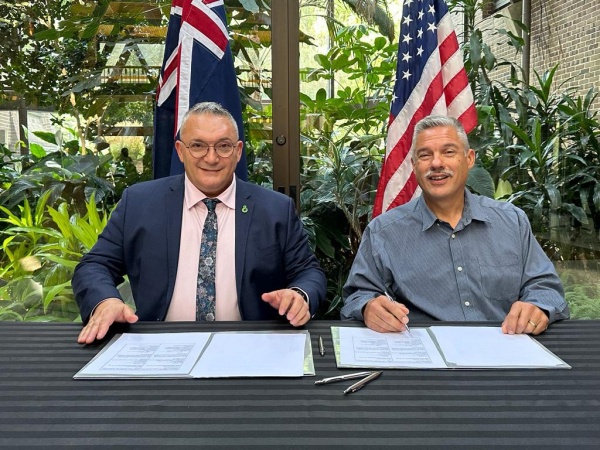
Ed Tuari and Steve Dupuis signed the education cooperation arrangement
“We are working to build people’s understanding of New Zealand as a country with a unique bicultural heritage and strong social justice values,” DuBois Jennings, ENZ’s Director of Engagement, North America said.
“The new agreement reflects that New Zealand is an ideal education destination for students from historically marginalised backgrounds, and it opens up exchange possibilities for Māori and Pasifika students from New Zealand to experience education on US campuses.
“We have been developing these relationships over several years, including at NAFSA earlier this year. Future possibilities include agreements between LSAMP-NICE and individual New Zealand providers.”
In late 2021 the National Science Foundation, Te Kāhui Amokura and ENZ worked together on a series of virtual information exchange sessions, which covered indigenous language research, indigenous data sovereignty, and the impacts of climate change on indigenous communities. More than 150 experts took part, including Native American, Alaskan Native, Native Hawaiian, and Māori scholars.
LSAMP-NICE is funded by the Louis Stokes Alliances for Minority Participation (LSAMP) programme, an alliance-based programme which aims to diversify the science, technology, engineering and maths (STEM) workforce in the US by increasing the number of STEM degrees awarded to historically underrepresented populations, specifically African Americans, Hispanic Americans, American Indians, Alaska Natives, Native Hawaiians, and Native Pacific Islanders. Salish Kootenai College, a Tribal College based in Montana serving the Confederated Salish and Kootenai Tribes, is LSAMP’s lead institution.
-
Connecting careers in Bay of Plenty and Waikato
This new online resource hub supports international secondary school students to pursue tertiary education and employment opportunities in the regions.
Secondary schools can use the tool to showcase the exciting range of opportunities in the students’ backyard. It encourages them to explore, plan, connect and succeed.
International students staying in the regions bring many benefits, including addressing skill shortages in key industries where skilled workers are in high demand, increased spending and promoting global citizenship and diversity.
Education Tauranga regional relationship manager Melissa Gillingham says providing a comprehensive international student journey plan is becoming increasingly important.
“This allows students and their parents to see the opportunities that exist in the regions, from the school sector, into the tertiary sector and through to employment,” she says.
“Excellent existing relationships across all education sectors within our region allowed us to hit the ground running, creating, delivering and promoting our international student journey plan. We would like to thank all our stakeholders for their support.”
Education Tauranga partnered with Education New Zealand Manapou ki te Ao, Te Waka and Rotorua NZ to help bring Career Connect to life.
-
Education delegation to Asia
One of the real highlights of the trip for the Minister was meeting New Zealand alumni, compelling ambassadors for a New Zealand education. Vikra Ijas is a former University of Auckland student and co-founder of Kitabisa, a crowd-funding platform in Indonesia. His story of schooling and tertiary study in New Zealand leading to the establishment of his fundraising platform for social good in Indonesia was truly inspiring.
South Korea
The programme in South Korea included the Minister’s speech to the Korean International Education and Career Fair. This is the largest international education fair in South Korea, with an estimated 25,000 attendees. More than 40 New Zealand providers were present, many exhibiting on the Education New Zealand country pavilion.
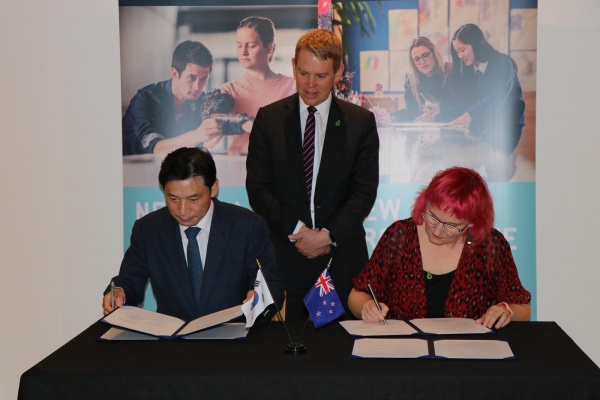
The Minister also witnessed the signing of the Education New Zealand-Incheon Education Cooperation Arrangement (ECA). The formal partnership, based on the ECA, has been designed to establish and strengthen communication ties between ENZ and the Incheon East Asia Global Education Institute, to identify creative areas of potential collaboration and to open up more learning possibilities for our institutions and students.
Minister Hipkins also attended an event with New Zealand education agents, alumni and institutions to celebrate the 60th diplomatic anniversary between South Korea and New Zealand.
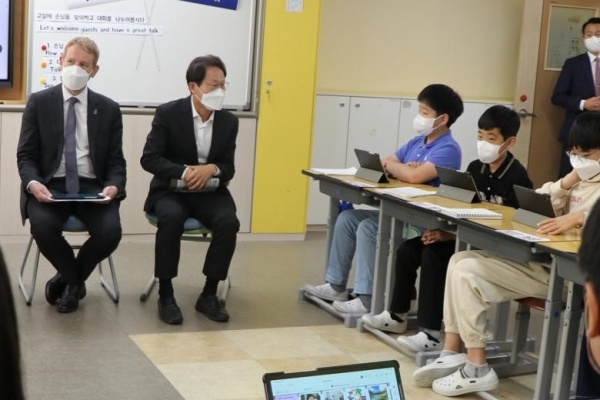
One of the highlights of the Minister’s visit to South Korea was on 24 October 2022, when the education delegation visited Kyodong Elementary School, the oldest school in South Korea (established in 1894). The delegation toured the school and interacted with the students who are participating with Raumati Beach School in the New Zealand - Korea digital cultural exchange programme supported by Education New Zealand and facilitated by Learn English Live.
Indonesia
The programme in Indonesia included bilateral meetings with the Secretary General of the Ministry of Education and Culture, the Coordinating Minister for Human Development and Culture, the Minister for National Development Planning and the ASEAN Secretary-General. The Minister also met with the President Director of Lembaga Pengelola Dana Pendidikan (LPDP), the key Indonesian government scholarship agency, to discuss opportunities to promote New Zealand as a destination for the awardees while further expanding the number of New Zealand institutions eligible to receive the scholarship students.
As well as the visit to Kitabisa, the Minister also had the opportunity to meet a group of Kiwi students interning at WIR Group (Metaverse) in Jakarta under the Prime Ministers Scholarship for Asia. The students were thriving on the unique opportunity and wringing every bit of experience from their internship at WIR. He also launched KIWI Challenge 2022, the annual entrepreneurship competition for Indonesian high school students organised by Education New Zealand.
As with South Korea there was a reception in Jakarta with agents, alumni, PMSA students and key stakeholders.
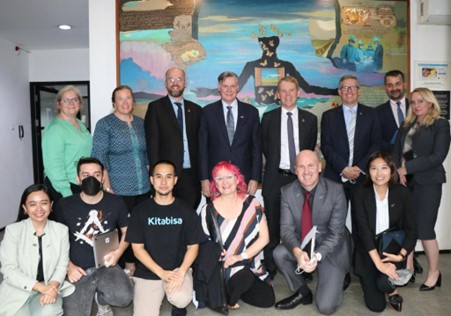
Singapore Visit
The focus of the Singapore leg of the visit was signing the refreshed Education Cooperation Arrangement with the Minister of Education from Singapore. The arrangement, first signed in 2018, confirms New Zealand’s commitment to engaging with Singapore on education cooperation initiatives in key policy areas including early childhood education, digital classrooms/blended learning, vocational and lifelong learning, sports and physical education, STEM uptake, and the development of mental health support programmes for the sector.
The Minister also made several institutional visits. The first was to the Institute of Technical Education Central College to understand where Institutes of Technical Education fit within Singapore’s education ecosystem; and the second was the Public Service Sector and Civil Service College. The purpose of this visit was to understand the role that the Civil Service plays in designing, developing and delivering programmes for the Public Service.
The final visit of the trip was to the Centre for Strategic Focus. The Centre is part of the Strategy Group in the Prime Minister’s Office which was set up to focus on whole of government strategic planning and prioritisation.
“The messages around the strong commitment of the New Zealand government to international education were very well received by our partners,” says ENZ Regional Director Ben Burrowes. “Whether via student mobility, international education partnerships or systems level dialogue, it’s exciting to see the interest generated through New Zealand stepping up its international engagement once again.”
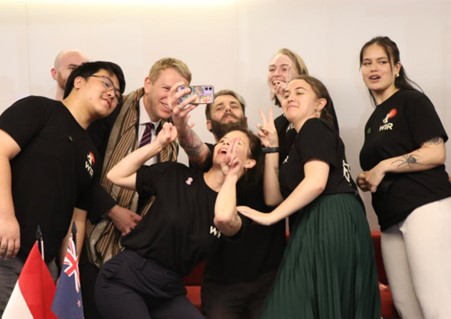
-
Hands-on environmental studies for US students
EcoQuest Education Foundation is a charitable trust and PTE based in Whakatīwai, with strong connections to Ngāti Paoa and Ngāti Whanaunga.
“We had a wonderful day on the Wharekawa Coast,” says Ria Brejaart, EcoQuest’s Academic Director.
“Led by mana whenua, our students welcomed special guests US Consul General Sarah Nelson, Director of USA Study Abroad Heidi Manley, and Senior Education Advisor US Consulate General, Katie Sleeman. EcoQuest’s Board of Trustees and academic associates also attended the event, along with other key supporters.
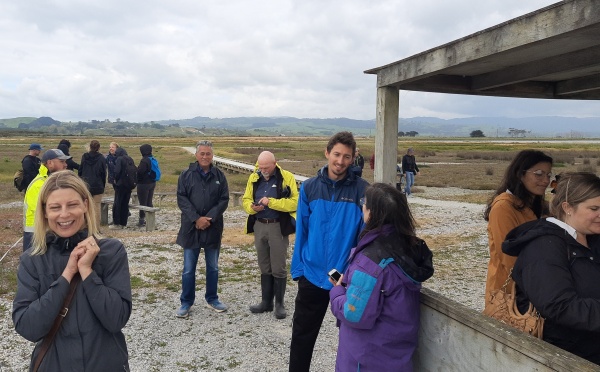
EcoQuest team and manuhiri at the bird hide.
“It was a great way to celebrate both the return of our US students after a long Covid-19 hiatus, and our enduring relationships with our collaborators and supporters. It felt particularly apt to be on the shores of Tikapa Moana, where the kuaka (bar-tailed godwits) return each year from Alaska.
“The morning of observing birds on the shell-banks was followed by a visit to Pūkorokoro Miranda Shorebird Centre, for a talk by Keith Woodley, Centre Manager. We then returned to EcoQuest where we marked the occasion by presenting Tū Ngātahi pins to all our students, on behalf of Education New Zealand Manapou ki te Ao.”
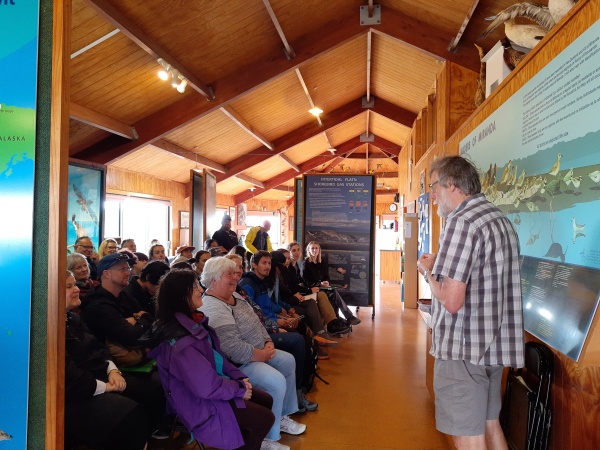
A presentation from Keith Woodley (Pūkorokoro Miranda Shorebird Centre Manager). Front row left, Beth Coleman (EcoQuest Board Chair) and Sarah Nelson (US Consul General).
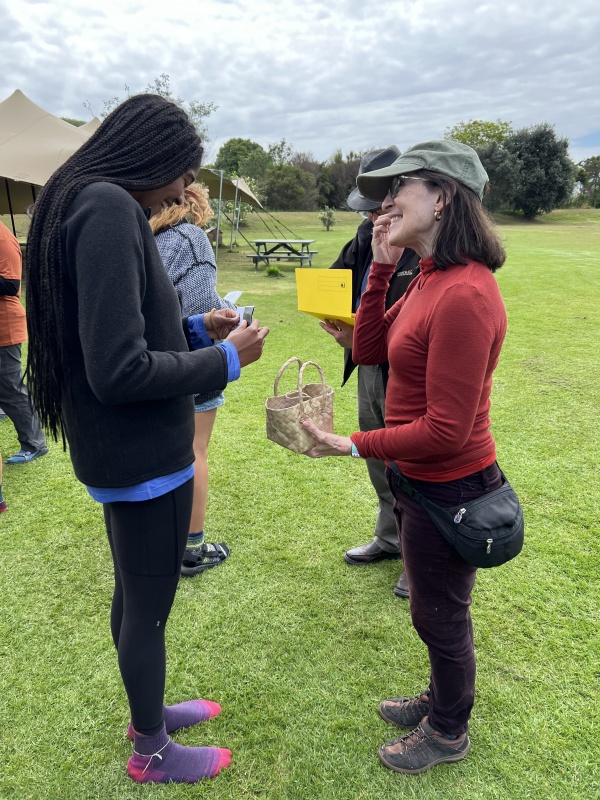
Beth Coleman (EcoQuest Board Chair) and Jono Clark (Director) presented Tū Ngātahi pins to the students.
The eighteen students are from the University of New Hampshire (UNH), Cornell University, University of Michigan, and Colorado State University. They are participating in a fifteen-week residential semester programme with EcoQuest, which offers undergraduate programmes in partnership with UNH. Students gain credits for their undergraduate degrees back home.
“Within the international education sector, EcoQuest contributes high-quality, niche programmes,” says Alana Pellow, Business Development Manager at ENZ.
“These international student programmes align well with New Zealand’s areas of excellence in ecology, restoration ecology, environmental policy, and sustainability. EcoQuest students undertake real-time research for many different collaborators including iwi, NGOs and trusts, councils, private land owners and the Department of Conservation. Academic and scientific rigour are the basis for these unique hands-on learning opportunities.”
“EcoQuest also contributes to international thinking around indigenous approaches to sustainability, through inclusion of elements of Te Ao Māori and mātauranga in its education and research activities.”
The current students are part of Cohort 4, the final cohort of international students to be given entry to New Zealand through a border exception earlier this year. Cohort 4, which was jointly led by ENZ and the Ministry of Education, saw 5,000 international students from 109 different countries nominated for student visas, before New Zealand’s borders fully reopened in August.
-
Getting to know the Chinese government education agencies
To introduce Michael Zhang, incoming Regional Director Greater China and to farewell outgoing director Miranda Herbert, the China team at Education New Zealand Manapou ki te Ao (ENZ) met with key education agencies in Beijing in October 2022.
“The meetings were an opportunity to reaffirm the long-term good relationship between New Zealand and Chinese government education agencies,” Michael Zhang says.
“We were able to share updates about recent work, hear from each agency about their plans, and discuss possible opportunities for future collaboration with New Zealand institutions.”
Ministry of Education, People’s Republic of China (MoE)
The Ministry of Education is the key government body responsible for the development of China’s education system, from early childhood education through to higher education. Key focus areas include the development of national strategies, policies and plans for education reform and development.
The Department of International Cooperation and Exchange coordinates the Ministry’s engagement with foreign countries. The Department’s key functions include:
- Managing and guiding international education cooperation and exchanges
- Drafting guidance and policies for the management of Chinese students studying abroad, international students studying in China, Chinese-foreign cooperative joint ventures and schools for foreign children
- Supervising international cooperation and exchanges in the education sector
- Guiding the work of education departments/divisions in Chinese embassies/consulates
- Planning, coordinating and guiding the teaching of Chinese as a foreign language
- Conducting educational cooperation and exchanges with the Hong Kong Special Administrative Region, the Macao Special Administrative Region and Taiwan Region of China.
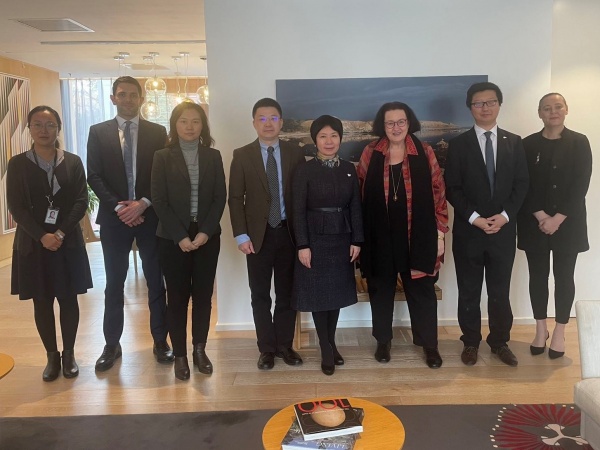
L to r: Rosemary An (ENZ), Kieran Knight (MFAT) Director You Jia (China MoE), Deputy Director-General Chen Dali (China MoE), Director-General Liu Jin (China MoE), H.E. Clare Fearnley (NZ Ambassador to China), Michael Zhang (ENZ), Miranda Herbert (ENZ)
New Zealand’s Ambassador to China, Clare Fearnley, hosted a lunch on 27 October 2022, for China Ministry of Education Director-General Liu Jin and his team, in partnership with ENZ.
Both sides emphasised the value and warmth of the bilateral education relationship, underpinned by a long history of cooperation and several recent milestones despite the challenges of COVID.
There was strong interest to build on the positive ministerial engagement in August and the upcoming 10th Joint Working Group in late November, including hopes for high-level visits next year in both directions. Opportunities to engage with China MoE include high-level visits, and policy advice through ENZ’s China team.
Chinese Service Centre for Scholarly Exchange (CSCSE)
Initially founded in 1989, CSCSE is a public organization under China Ministry of Education (MOE). CSCSE specialises in offering professional services for international scholarly exchanges, including Chinese students and scholars studying abroad, returnees from overseas, and international students and scholars coming to study in China.
CSCSE is also dedicated to promoting the internationalisation and capacity-building of Chinese higher education institutions, as well as improving education resources through international exchanges and collaboration.
CSCSE is the only official organisation that provides overseas credential evaluation and recognition services in China. The statement of comparability of overseas qualifications issued by CSCSE is widely recognised by Chinese employers and institutions from various sectors. CSCSE is an active member in the international education community, facilitates global talent mobility and improves international recognition of qualifications. CSCSE has long-term partnership with foreign qualifications authorities, including NZQA.
CSCSE manages and executes the China International Education Exhibition Tour (CIEET), which New Zealand has regularly attended in past years. CSCSE also organises the China Study Abroad Forum in March each year, in which ENZ is a regular speaker and participant.
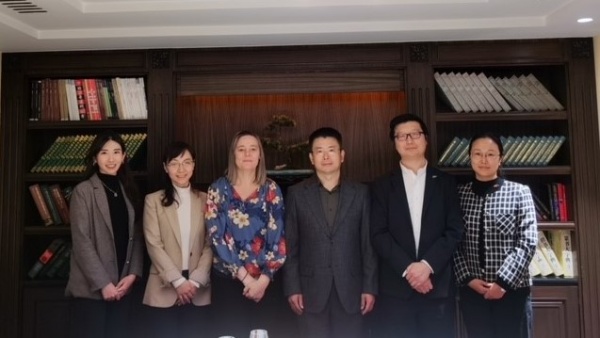
L to r: Xu Chenxing (CSCSE), Director Yu Haiying (CSCSE), Miranda Herbert (ENZ), Deputy Director-General XIA Jianhui (CSCSE), Michael Zhang (ENZ), Rosemary An (ENZ)
Opportunities to engage with CSCSE include student recruitment fairs, study in China, international conferences, verification of foreign credentials, and transnational education programmes.
China Education Association for International Exchange (CEAIE)
CEAIE was founded in 1981 as a not-for-profit organisation to encourage international exchange and cooperation. It is a key organisation in facilitating foreign engagement with the Chinese education system.
Headquartered in Beijing, it has provincial associations for international exchange in 31 provinces, autonomous regions and municipalities in China, as well as local chapters in 16 major cities. It has relationships with more than 170 education organisations in more than 50 countries (including Universities New Zealand). CEAIE has been granted Special Consultative Status with the Economic and Social Council of the United Nations and has established official relations with UNESCO.
Every year in October, CEAIE organizes the China Annual Conference for International Education (CACIE), and the China Education Expo (CEE) both of which ENZ attends. New Zealand was designated Country of Honour at the 2015 conference and expo, which has provided remarkable marketing exposure for New Zealand education. Miranda Herbert from ENZ attended CACIE in October 2020 as a VIP guest and delivered a keynote speech, and in 2021 received a prestigious award recognising ENZ as an ‘outstanding international partner’. Among its activities, CEAIE supports major people-to-people dialogue and exchange mechanisms with partner countries and provides quality assurance services for China-Foreign cooperative transnational education programmes.
Currently, there is strong collaboration between the New Zealand education sector and CEAIE, and their initiatives across various sectors. The university sector held the 5th NZ-China Higher Education Forum with the support of Universities New Zealand and CEAIE on 10 November 2022. CEAIE also expressed interest in collaborating with the New Zealand school sector around Sister School Programmes and exploring opportunities to facilitate Leadership and Capacity building. ENZ is following up with CEAIE on the leadership opportunities and plans to run an Expressions of Interest process once more details are available.
Opportunities to engage with CEAIE include student recruitment fairs, conferences, school cooperation, training, and Quality Assurance for joint programmes.
Positive meetings were also held with other agencies affiliated to China MoE, including the China Center for People-to-People International Exchange (CCIPE) and China Scholarship Council (CSC).
CCIPE highlighted the growing strength and success of our Early Childhood Education Symposium, while CSC emphasised their desire to see increased numbers of Chinese scholarship students choose New Zealand for their studies, particularly at PhD level. All eight New Zealand universities have signed MOUs with CSC. New Zealand students can also study in China on fully-funded scholarships, by applying directly through CSC. There are programmes in English and Chinese: CSC Scholarships | China Scholarship Council | Chinese Government Scholarships (chinesescholarshipcouncil.com)
-
Join us for the Latin America Study with New Zealand Virtual Fair
“The fair will be a great opportunity for providers to connect with prospective students in the Latin American market, using an interactive digital platform,” says Javiera Visedo, Director of Engagement Latin America for Education New Zealand Manapou ki te Ao (ENZ).
“ENZ is seeking expressions of interest in the fair, which we are hosting in collaboration with FPP. If you are interested in participating, please fill out the Expression of Interest form by 9 December 2022.”
Invitations to register will follow in the new year.
Find out more about Latin America
Key areas of focus for ENZ in Latin America include Brazil, Colombia and Chile, and we have staff based in São Paulo and Santiago.
Close to 6,000 international students came to New Zealand from Latin America in 2019, and Brazil is our eighth largest market. Since the pandemic there has been intense activity from our competitors with many of them establishing in-country representatives, which demonstrates the importance of this region in international student recruitment.
Beyond student recruitment, ENZ also values the government and education connections with the region.
ENZ recently hosted a series of Latin America Masterclasses, which saw participants from around Latin America tuning in to watch live lectures delivered by New Zealand academics.
In June this year, Education Minister Chris Hipkins created great buzz with his visit to Brazil and Chile, part of his first international trip since the beginning of the pandemic.
Group recipients of the Prime Ministers’ Scholarships for Latin America have recently started making their way to Brazil, Colombia and Chile to participate in short study exchanges. These include several Māori led groups, supporting connections with indigenous nations in the region.
In September, ENZ attended the FPP Virtual Fair in Colombia. The fair had more than 800 visitors, with over 100 visiting the ENZ booth. There was strong interest in tertiary programmes and language studies. The virtual fair was a great opportunity to promote New Zealand as a study destination within the Latin American market.
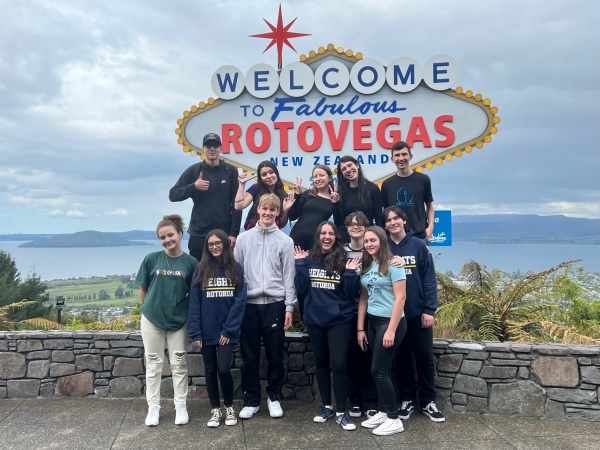
A group of 100 high school students from Paraná State in southern Brazil had a three-month study experience this year with schools in Auckland, Rotorua, Hawkes Bay, Palmerston North, Wellington, Canterbury and Invercargill.
Brazil
In 2019, there were 3,324 Brazilian students studying in New Zealand. Being from non-English speaking countries, the majority of Latin American students will start their education experience in New Zealand studying English. Scholarships offered by the local state governments have also contributed to the presence of Brazilian students in New Zealand and in 2022, 100 students from the state of Parana in Brazil travelled to New Zealand on a 3-month exchange. The students were placed at high schools across the country and gave positive feedback about their time here.
Colombia
Colombia is New Zealand’s second largest market in Latin America, second only to Brazil. In 2019, there were 1,360 Colombian students studying in New Zealand.
In 2023, 22 students from Bogotá, Colombia, will travel to New Zealand to study during terms one and two. Most of the students will be based at schools across the North Island, with one group heading down to Nelson.
On 23 November 2022, ENZ launched the I AM NEW campaign in Spanish at an event in Bogotá, to promote a New Zealand education.
Chile
The recent CAPE LatAm ‘Celebrating 50 years of diplomatic relations with Chile’ event, hosted at Parliament, was a great example of the rich history of connections between New Zealand and Chile.
Chile is New Zealand’s third largest market in Latin America. In 2019, there were 1,193 Chilean students studying in New Zealand. The majority of Chilean students come to New Zealand to study English Language, but enrolment in schools has also been consistent, with 17% of students studying at New Zealand schools in 2019.
Flights
Latam will be resuming their daily flights to Sydney via Auckland from mid-December and Qantas is flying three times per week from Santiago direct to Sydney. Although the cost of flights is high, in line with worldwide trends, the resumption of regular flights demonstrates the high demand for the Latin America to Oceania route.
Expressions of interest in the Latin America Study with New Zealand Virtual Fair are due by 9 December 2022. You can access the online form here.
If you have any questions about the event, please contact latinamerica@enz.govt.nz
-
Reconnecting with stakeholders in Japan
Across the two days, 68 representatives from education and travel agencies, schools, universities and ENZ’s education partners in Japan networked with 19 New Zealand education providers, regional representatives and edtech company, Chasing Time English, and heard updates from ENZ. Networking opportunities included one-on-one meetings, and a reception at iki, a newly opened New Zealand-themed roastery and eatery in Tokyo. Key Japanese partners including ENZRA agents, Ministry of Education, Culture, Sports, Science and Technology, and ENZ’s Education Cooperation Partners: Tokyo Metropolitan Board of Education, Japan Women’s University and Waseda University attended the event.
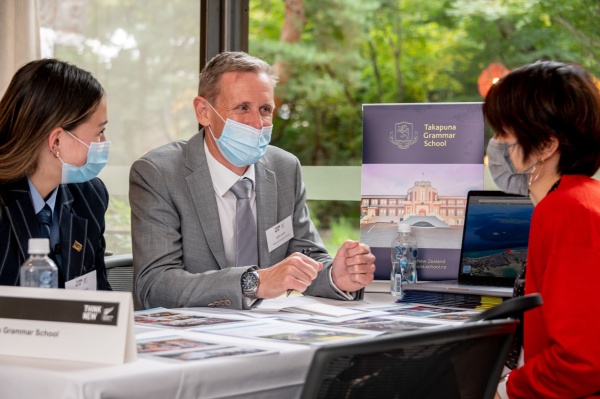
In terms of market trends, Misa Kitaoka, ENZ’s Director of Education in Japan, noted the increasing demand for “one term school study” in New Zealand, which can be attributed to changes made in admission requirements by the Japanese universities.
“With the Japanese government’s internationalisation efforts, more and more universities in Japan are now adopting a holistic assessment of applicants, based on their high school grades, English language skills, extracurricular activities, and essays, in addition to the traditional written exams,” Ms Kitaoka says.
“Students who study abroad have a competitive advantage in these assessments – their English and communication skills improve, and they gain a wide range of life experiences overseas. With this new trend, we are expecting to see more secondary schools sending their students for one term or longer to New Zealand, to help them prepare for admission to university.”
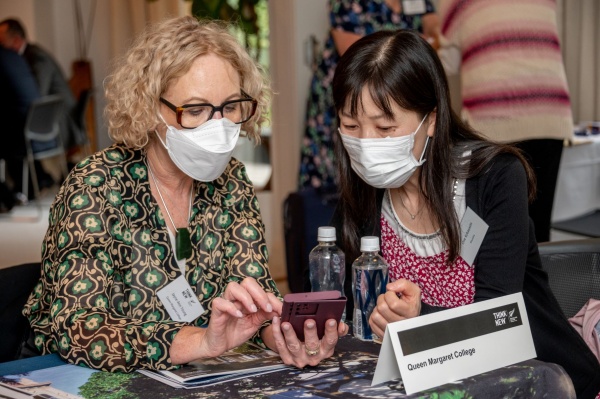
Japanese agents and educators are also interested in New Zealand’s full Bachelor’s degree programmes, given the increasing number of bilingual Japanese/English students in Japan. With more International Baccalaureate (IB) schools (the Japanese government’s current target is 200 IB schools) and the improvement of English language education in Japan, more students in Japan are prepared to apply directly to New Zealand tertiary institutions after finishing high school.
“We are excited to work with ENZ to start an annual, outbound group study programme for our affiliated schools,” Ryohei Matsuoka from the International Office at Waseda University said. “We are planning to send more than 70 Waseda high school students to Manawatu and Hawke’s Bay in March 2023. With Waseda’s increasing interest in New Zealand’s tertiary education, the programme will incorporate visits to tertiary institutions in addition to study at secondary schools.”
ENZ and Air New Zealand are co-hosting and co-funding a “famil” for the executive members of Waseda University and its affiliated schools in late November, visiting schools and tertiary institutions in the two regions mentioned above.
Due to Japan’s border restrictions which were in place until October, and the ongoing Covid-19 restrictions, ENZ did not undertake a student-facing event this year, and is planning to restart student fairs in 2023.
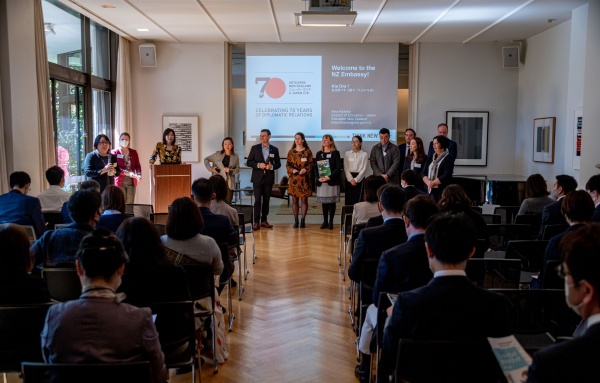
Social media coverage of the stakeholder events was well received and generated a high level of engagement.

